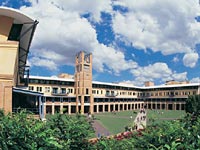|
||||||||||||||||||||||||||||||||||||||||||||||||||
| Commerce - 8404 | ||||||||||||||||||||||||||||||||||||||||||||||||||

The Master of Commerce program has a long and distinguished history in providing high quality, relevant business education to graduates who wish to broaden their undergraduate business degree and those from non-business backgrounds wishing to develop their skills and knowledge in business. The Master of Commerce program is taught on-campus. The typical program duration is 1.5 years full-time, or 3 years part-time. Program Objectives and Learning Outcomes On successful completion of the MCom, students will have the ability to:
The Master of Commerce consists of 12 courses (4 core courses, 6 disciplinary courses and 2 elective courses).
Core courses
and
or
Note: Depending on the specialisation chosen students undertake COMM5004 or COMM5005.
Disciplinary courses
The disciplinary courses selected will depend on the chosen specialisation. Fifteen specialisations are available within the MCom program.
Each specialisation includes 2 disciplinary core courses. The remaining 4 disciplinary courses may be prescribed or selected from a list. Area(s) of Specialisation
Elective courses
Elective courses may be taken within the same disciplinary stream as the specialisation, or from any disciplinary stream available in the MCom program.
Please refer to the Program Structure for the academic requirements relating to this program.
For information regarding fees for UNSW programs, please refer to the following website: https://my.unsw.edu.au/student/fees/FeesMainPage.html
Please refer to the Australian School of Business website for further detail.
Please note that these requirements may be subject to change.
Students are advised to follow requirements according to the year they commenced. Please refer to previous editions of the Online Handbook for your program requirements. Contact the Australian School of Business Student Centre for advice. tel: + 61 2 9385 3189 location: Ground Floor, West Wing, Australian School of Business Building Forms, policies and procedures Frequently asked questions Related Program(s) |
||||||||||||||||||||||||||||||||||||||||||||||||||


